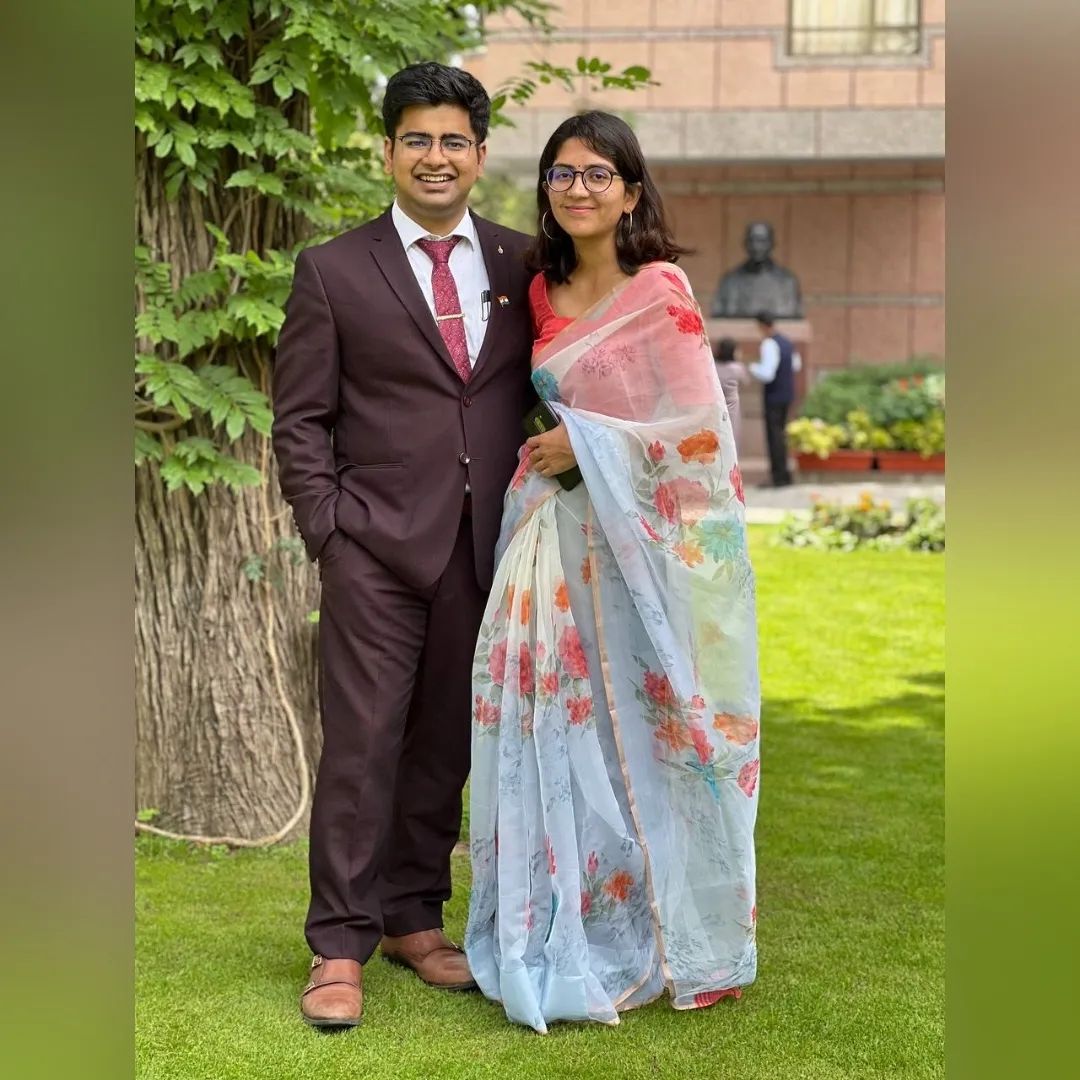
Hello, my name is Mukund Singh Chahar, and I received AIR 273 in UPSC CSE 2022. I attended school in Bhopal and then went on to study History (Hons) at PGDAV College, Delhi University.
Table of Contents
Mukund Singh Chahar UPSC Booklist
Mukund Singh Chahar UPSC Marksheet (Prelims)
| Mukund Singh Chahar UPSC Marksheet (Prelims) | |
| Roll Number | 0413479 |
| Name | Mukund Singh Chahar |
| Paper 1 | Unknown |
| Paper 2 | Unknown |
Mukund Singh Chahar UPSC MARKSHEET (MAINS)
| Mukund Singh Chahar UPSC MARKSHEET (MAINS) | |
| Subjects | Marks |
| ESSAY | 129 |
| GENERAL STUDIES 1 | 105 |
| GENERAL STUDIES 2 | 104 |
| GENERAL STUDIES 3 | 81 |
| GENERAL STUDIES 4 | 100 |
| Optional Paper 1 | 135 |
| Optional Paper 2 | 128 |
| Written Total | 782 |
| Personality Total | 190 |
| Final Total | 972 |
Mukund Singh Chahar Biography
| Mukund Singh Chahar Biography | |
| Particulars | Details |
| Name | Mukund Singh Chahar |
| Age | Unknown |
| All India Rank | 273 Rank |
| Roll Number | 0413479 |
| Marks | 972 |
| Optional Subject | History |
| Hometown/City | Bhopal |

JOURNEY IN CSE
I began studying in 2017, but failed to pass the preliminary exams on my first two attempts. I subsequently decided to change my focus to MPPSC, believing that I lacked the necessary skills to pass UPSC. But when COVID struck, it postponed the UPSC exam, giving me a second chance.
Fortunately, I passed prelims on my third attempt, but I was unable to pass mains this time. I passed both the prelims and mains on my fourth attempt, but my interview score of 135 kept me out of the holy PDF.
I only had 5 days to recover from this defeat because the UPSC 2022 Prelims were just around the corner. I took the exam anyhow, although I wasn’t even sure I’d pass. Fortunately, I was successful.
I didn’t look back after that and was able to pass the exam this time. But, to be honest, this was the year when I experienced the most self-doubt and my confidence was at an all-time low.
I want to relate this experience because I know that every aspirant faces challenges along the way, and I just want to emphasise that I was no exception.
It’s normal to have bad days, and it’s okay to doubt yourself, but one should never give up hope. Remember that hope is a wonderful thing, perhaps the best thing, and that no good thing ever dies (from ‘The Shawshank Redemption’).
UPSC CSE TIPS:
I. PRELIMS:
To be honest, Prelims was the most difficult level for me. But there are some tactics that worked well for me, and I’d be happy to share them with you.
- Prelims Booklist: You will be given numerous recommendations for good prelims books. I won’t add to it, but I’d like to offer a few of suggestions:
i. Look over multiple toppers’ suggestions. Don’t blindly imitate the strategy of a single top performer; instead, seek for elements that will benefit your preparation and tailor your booklist accordingly.
ii. Select a small number of sources and edit them several times. A source that has been amended four times is far more useful than four sources that have only been revised once. - Preliminary Exam Do’s and Don’ts:
i. Previous year questions (PYQ) Analysis: PYQs are essential for understanding the weightage of different subjects and the test pattern. In fact, motifs from PYQs are frequently repeated. Thus, try to complete the previous ten years’ PYQs and thoroughly analyse them in order to gain a better grasp of the exam.
Mock tests are vital for testing your preparation. Perform 2-4 sectional tests for each subject, followed by 3-4 full-length tests. The total number of tests can range between 20 and 40. To discover your weaknesses, you must also analyse and revise these examinations, and you must have a question bank of 2000-4000 questions.
iii. Simulation: Prelims are rapidly becoming a high-pressure exam in which your knowledge is not always the sole thing being tested. To be better prepared, it is necessary to simulate the exam, which includes delivering mocks in an environment comparable to the actual exam. It includes having a set time limit of two hours, filling out OMR sheets, sitting on shaky chairs/tables, giving tests for which you have not prepared, and so on. The goal is to put oneself in stressful situations and learn how to handle them. - Preliminary Exam Don’ts: i. Do not read numerous sources for the same subject.
ii. Don’t overlook the significance of revision.
iii. Don’t merely administer mock tests; always analyse and revise them.
II. MAINS:
1. Booklist: Once again, go over several toppers’ suggestions, limit your sources, and edit them. Also, one easy method for mains is to focus on ‘covering the curriculum’. Cover each syllabus keyword, and if possible, maintain very brief notes for last-minute revision before the mains.
- Mains Preparation:
i. PYQs: PYQs are still essential in mains, with themes likely to be repeated. Try to cover the last ten years of PYQs.
ii. Answer writing practise: In mains, answer writing is the deciding factor. It makes no difference how much you know unless you know how to articulate it within the time constraints. Begin with PYQs, then progress to sectional tests, and then full-length tests. Answer writing abilities take time to develop, so be patient and persevere.
iii. Value addition: Concentrate on gaining extra points by adding value. Maps in GS1, Constitutional articles and decisions in GS2, Facts and Data in GS3, and relevant instances in GS4 can all help you enhance your score.
iv. Time and space management: I had created draughts for each GS paper in order to prepare my responses. These draughts assisted me in both saving time and boosting my presentation. My draught for Art and Culture, for example, was like follows:
{ Intro:……….
Discuss the art’s relevance-period-patterns.
A flowchart of all the art/crafts requested OR A MAP
Body:………
Think in terms of Architecture-Painting-Culture-Dance-Theatre-Literature-Sculpture or think in terms of Architecture-Painting-Culture-Dance-Theatre-Literature-Sculpture.
OR for art significance/relevance (PESTEL).
Address the demand for Qs.
Describe LIMITATIONS using a flowchart.
The way forward:………
Flowchart: Legal (AMASR 1958, Antiquities Act 1972), Schemes (Rashtriya Sanskriti Mohotsav, Scheme for Protecting Intangible Heritage, Adopt a Monument), Technology (Arts Digital Database)
Conclusion:…… Uphold constitutional provisions to conserve art (Art 49: Monument and heritage preservation, Art 51 A: Heritage protection) - Mains Don’ts: i. Do not prepare for Prelims and Mains separately. Try to integrate your preparation by focusing on sources that will be useful in both the prelims and the mains.
ii. Don’t overlook the importance of composing responses. At least 3-4 tests for each GS paper, 3-4 essays, and 5-6 optional examinations. This figure is subject to change.
iii. In the mains, don’t aim to write 20 perfect answers. No one is capable of doing so. Concentrate on completing your paper on time. - SPECIFIC ADVICE:
- Essay: I received a 129 in Essay this year, and I believe I increased my grade by writing from the heart rather than from a mechanical manner. In addition, I had a flexible draught that I adhered to, which is as follows:
DRAUGHT ESSAY: - ANECDOTE: should be relevant (1-1.5 page maximum), avoid digression and hit the target right away, completely link the anecdote to the topic and defend it.
- After that, write: and ‘therefore the foregoing incident proves the age-old adage: X’.
- Definition paragraph: Explain the terms, and if possible (briefly) mention philosophers and examples to validate your definition.
- BODY: GS I-IV method, maintain Argument-substantiation-inference strategy, emphasise on logical connectedness and flow (for example, from person to society, evolution to history, and beyond).
- Rebuttal: 2-3 paragraphs, 2 rebuttals/interpretations (use the argument-substantiation-inference model)
- Conclusion: Summarise your views, provide new instances connected to the topic (proportionate weightage: more to the core, less to the counters), 1 futuristic paragraph (short stakeholder approach (individual Art 51A, international: SDGs) + connect with INTRODUCTION ANECDOTE.
Optional (History)
I raised my score from 205 in 2020 to 276 in 2021 and 263 in 2022. My general historical advice is as follows:
i. Sources: Followed Balyan Sir’s notes and filled gaps by performing last 10 year PYQs correctly. I used Self-study history and Nandini Maharaj Mam’s notes for maps.
ii. Revision: My sources were limited, but I had revised them so many times that I had a firm handle on my notes.
iii. response writing: Because history questions can be complex and ambiguous at times, proper response writing practise and PYQ evaluation can help you prepare.
Interview
I received 135 points in my 2021 interview. I was saddened and began to doubt my fitness for civil service. Fortunately, I was able to raise my score to 190 this year, thanks to the following strategies:
i. Raising awareness: I read two newspapers (The Indian Express and The Times of India), discussed current events with my classmates and seniors, and began to consider topics of national and worldwide importance. These activities increased my awareness of my surroundings.
ii. Improving communication: Mirror talk (speaking to oneself in front of a mirror) and more contacts with individuals around me aided me in this area. I also saw topper fake interviews in order to learn from their communication abilities.
I mimicked the interview room by printing out photographs of UPSC members and putting them on the walls around me. I then sat in the middle of the room on a chair and pretended to conduct a half-hour interview. Exercises like this one helped me relax and prepare for the actual interview.
iv. Know yourself: Your Detailed Application Form (DAF) contains all important information about you and serves as a springboard for the interview board to ask questions. Fill out the DAF with care and honesty. After that, thoroughly research your DAF. To be truly confident in your DAF, you must first understand yourself thoroughly. Meditation and writing can be beneficial in this sense.
Finally, I’d want to remind readers that I used the words ‘lucky/luckily’ several times. The simple answer is that I believe that hard work can get you far, but luck also plays a role in your success. This is especially true for an exam with a very low success rate.
As a result, my recommendation to the fellow UPSC candidates is to work hard and be patient. You may or may not succeed, but if you stick with it, you will undoubtedly grow as a person. And there is no greater success than outperforming your elder self.

















